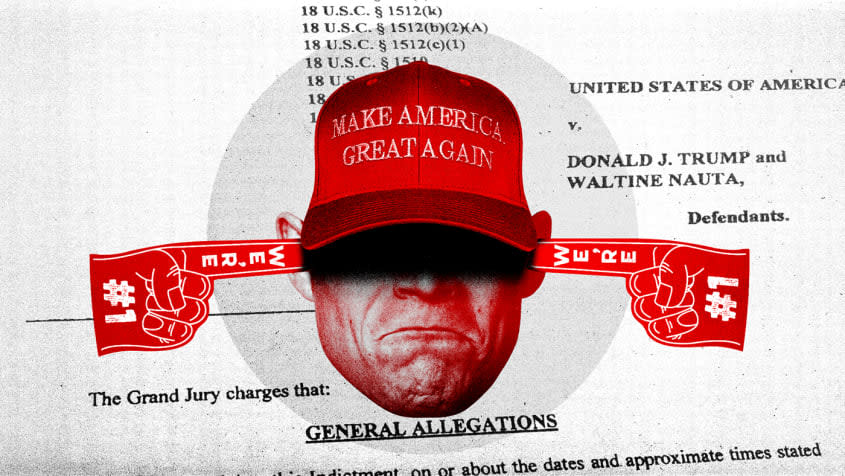What happens if Republicans accept that Trump is guilty?

Former President Donald Trump is the clear frontrunner for the 2024 Republican presidential nomination. He also faces the real possibility of being convicted of several felonies before Election Day.
Trump could be convicted of lying to New York State about paying off a porn actress to hide an alleged extramarital affair, or he could be convicted of keeping top secret national security documents in unsecured rooms and lying to the federal government when ordered to return them. He may also conceivably be convicted of illegally or violently trying to stay in power after losing the 2020 election.
Americans are presumed innocent until found guilty, and Republicans have by and large presumed that Trump is being unfairly persecuted, held to a higher standard than other politicians, or even innocent. That presumption became harder to maintain after news organizations obtained and published a two-minute audio clip of Trump appearing to confess to the felonies charged by special counsel Jack Smith in the secret documents case.
Trump and his conservative media allies are trying to spin this recording as inconclusive, no big deal, or even, as Trump claimed, an "exoneration." But what would happen if Republicans just presumed that Trump is probably guilty?
What are the commentators saying?
A few months ago, proving that Trump willfully kept documents he knew were classified "looked like a major obstacle to conviction. Not so much anymore," Bonnie Kristian wrote at The Daily Beast. The audio of Trump showing off secret Iran attack documents sure "sounds like an admission of guilt" — here's "Trump, with perhaps the most recognizable voice on Earth, saying he knowingly did exactly what he's accused of doing."
Trump is likely to be convicted, but he "shouldn't go to prison" — because he's old, this isn't a violent crime, and it's one "we can absolutely guarantee he won't and can't commit again: All we have to do is not reelect him as president," Kristian said. "One way for that to happen is for Republican voters to accept his guilt here. The tape should make it easy enough."
No, "the sickness of the Republican Party as it is presently constituted is that there is no conceivable set of facts that would permit it to acknowledge Trump's guilt," Jonathan Chait argued at New York Magazine. The GOP has shifted from fighting for conservative policies to just "ruthlessly" fighting, equating "scruples" with weakness. "A willingness to do or say anything to win was the essence of Trump's appeal," and now "the concept of 'crime' has been redefined in the conservative mind to mean activities by Democrats." Regardless of the strength of the cases against Trump, his GOP "loyalists have been trained to either deny any evidence of misconduct by their side or rationalize it as a necessary countermeasure against their enemies."
"It's not too late for the Republican Party," conservative former federal appellate judge J. Michael Luttig said in The New York Times. Trump "cynically calculated that his indictment would ensure that a riled-up Republican Party base would nominate him as its standard-bearer in 2024," and he appears to be right so far. "The stewards of the Republican Party" have "managed to convince themselves that an indicted and perhaps even convicted Donald Trump is their party's best hope for the future," but that's a losing bet — "there is no path to the White House for Republicans with Mr. Trump." And if Trump's plausible guilt on Espionage Act charges "fails to shake the Republican Party from its moribund political senses, then it is beyond saving itself. Nor ought it be saved."
What happens next?
Trump's trial on the documents and obstruction charges will start sometime between when the GOP presidential debates begin and when Republicans start voting for their party's nominee. So far, Republican lawmakers are split on whether to support Trump for president "if he's convicted of federal crimes," NBC News reported. "While some GOP lawmakers say they couldn't support a convicted felon for the White House, others are reluctant to close the door," and "the divisions scramble ideological lines." Privately, though, congressional Republicans express "more consternation about the possibility that a convicted criminal could be their party's presidential nominee."
GOP voters seem less disturbed by the idea. A recent NPR/PBS NewsHour/Marist poll found that 63% of Republicans said they would vote for Trump even if here were found guilty of a crime. "That so many rank-and-file Republicans would stick with Trump, seemingly no matter what, shows the real stronghold he has on the GOP base — and why he's considered the frontrunner to win the Republican nomination again," NPR News reported. But the Republican enthusiasm isn't broadly shared: The same poll — conducted April 17-19 among 1,291 adults, with a margin of error of ±3.4 percentage points — found that 64% of respondents don't want Trump to be president in general, and 70% are a no if he's convicted of a crime.
You may also like
What happens if Republicans accept that Trump is guilty?
South Koreans suddenly become younger thanks to new 'international age' law
Top Russian general knew about Wagner's mutiny beforehand, U.S. intelligence assesses
